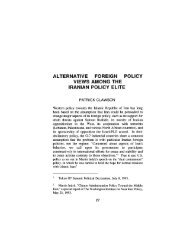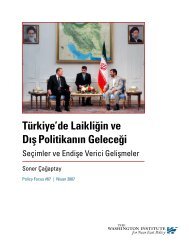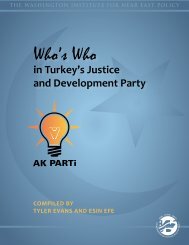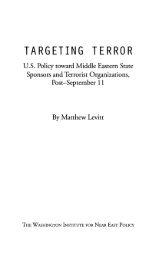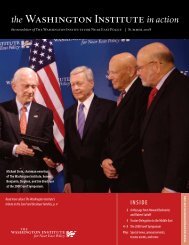Michael Eisenstadt David Pollock How the United States Benefits ...
Michael Eisenstadt David Pollock How the United States Benefits ...
Michael Eisenstadt David Pollock How the United States Benefits ...
You also want an ePaper? Increase the reach of your titles
YUMPU automatically turns print PDFs into web optimized ePapers that Google loves.
ASSET TEST<br />
Israel is taking steps to rectify <strong>the</strong>se problems,<br />
such as increasing funding for vocational training<br />
and primary, secondary, and higher education; creating<br />
business development programs in less advantaged<br />
neighborhoods and towns; establishing frameworks<br />
for haredi men to serve in <strong>the</strong> military (as a<br />
first step toward <strong>the</strong>ir integration into Israeli society)<br />
11 ; and increasing budgetary allotments for Arab<br />
municipalities—although Israeli officials recognize<br />
that significantly greater efforts will eventually be<br />
required in all <strong>the</strong>se areas. 12 It remains to be seen<br />
to what extent <strong>the</strong>se measures will succeed, though<br />
Israel enjoys a critical mass of productive, technologically<br />
sophisticated, well-educated, and relatively<br />
well-off workers who will continue to ensure that it<br />
maintains relatively high overall economic and technological<br />
standards for years to come. 13<br />
A Demographic Bomb?<br />
It is conventional wisdom in some circles that Israel<br />
faces a long-term threat of being overwhelmed by<br />
its own Arab citizens, who will eventually become<br />
a majority in Israel. In fact, however, birthrates<br />
of Palestinians in Israel have been declining over<br />
<strong>the</strong> years (as have birthrates of Palestinians living<br />
in <strong>the</strong> West Bank and Gaza) and are converging<br />
with those of Israel’s Jewish population. According<br />
to some estimates, <strong>the</strong> percentage of Palestinian<br />
citizens of Israel (currently some 20 percent<br />
of <strong>the</strong> population) is expected to reach 23 percent<br />
by 2020 and will plateau at around 26 percent by<br />
2050 (although demographic forecasts are notoriously<br />
unreliable). Thus, <strong>the</strong> challenge Israel faces<br />
is that of accommodating and integrating a large,<br />
increasingly ambivalent and alienated minority that<br />
suffers discrimination in government budgeting,<br />
access to services, and professional opportunities<br />
(even if it enjoys many more political freedoms and<br />
a higher standard of living than Arabs in neighboring<br />
states)—and not an Arab majority that will be<br />
able to use its power at <strong>the</strong> polls to dismantle <strong>the</strong><br />
Jewish state. 14 By all appearances, this is a manageable<br />
problem, if Israel takes commonsense measures<br />
to deal with it. 15 Some important first steps<br />
already taken in this regard include <strong>the</strong> launching<br />
of a national service initiative for Arab youth and<br />
an increase in budgets for job creation, infrastructure,<br />
and housing in Arab municipalities—though<br />
more can certainly be done. 16<br />
More problematically, it is widely believed in<br />
Israel, and increasingly outside <strong>the</strong> country, that if<br />
Israel continues to hold on to <strong>the</strong> West Bank, <strong>the</strong><br />
Jewish and democratic character of <strong>the</strong> state will be<br />
jeopardized—particularly once <strong>the</strong> Arabs become<br />
a majority in <strong>the</strong> area between <strong>the</strong> Mediterranean<br />
and <strong>the</strong> Jordan River. 17 While Israel’s continued<br />
commitment to a two-state solution and its restriction<br />
of most formal settlement activity to areas close<br />
to <strong>the</strong> 1967 lines leave open <strong>the</strong> door to a diplomatic<br />
settlement of <strong>the</strong> conflict, broad segments of<br />
international opinion believe Israel is taking steps<br />
that will preclude such an outcome, and are turning<br />
increasingly unfriendly toward <strong>the</strong> Jewish state. 18<br />
This could, indirectly, have a long-term impact on<br />
<strong>the</strong> U.S.-Israel relationship. Moreover, <strong>the</strong> continuation<br />
of <strong>the</strong> status quo is likely to undermine<br />
Israel’s image as a democracy, and to increase calls<br />
for a “one-state solution” to <strong>the</strong> Israeli-Palestinian<br />
conflict, which would make a diplomatic solution<br />
even more difficult to achieve.<br />
Delegitimization<br />
Some of those opposed to Israel’s continued occupation<br />
of <strong>the</strong> West Bank, and many opposed to<br />
Israel’s very existence, are increasingly turning to<br />
boycott, divestment, and sanctions (BDS) campaigns<br />
and <strong>the</strong> delegitimization of <strong>the</strong> Jewish state<br />
as a means of diplomatically isolating it, limiting its<br />
military freedom of action, and pressuring it to unilaterally<br />
withdraw from <strong>the</strong> West Bank. The most<br />
extreme members of this movement (a large part<br />
of <strong>the</strong> BDS crowd) conceive of Israel’s withdrawal<br />
from <strong>the</strong> West Bank as <strong>the</strong> first step toward <strong>the</strong><br />
Jewish state’s elimination. While such efforts have<br />
not garnered widespread international support and<br />
have had only a limited impact thus far, <strong>the</strong>y have<br />
<strong>the</strong> potential to harm investment in and exports<br />
from Israel. Should such efforts gain traction, <strong>the</strong>y<br />
54 sTraTegic rePorT 7 | eisensTadT, <strong>Pollock</strong>




